|
by Evan Cantor It is often claimed that the Do-It-Yourself scene of the 1980s (a/k/a “Cassette Culture”) provided opportunity for all comers, that there existed no hierarchy and no “star” performers. In one sense this is quite obviously true. If “star-dom” equates to celebrity in the wider world, participants in the scene could not achieve it since the scene was underground by definition. However, it would be disingenuous to assert that there were no “stars” of the underground. Amongst others, a few names illustrate this: Minoy, R.S. Moore, Campau, Smersh, Camper Van Beethoven, Viscera, Margolis. As its prime mover, I have always believed that Walls Of Genius were equally ‘stars’ of this scene. One of the marvelous aspects of the scene was that anybody could fire off cassettes and materials to various reviewers working in ‘zines, flyers and magazines of the age. You could be reasonably assured that the materials would be received and perhaps listened to or looked at, as opposed to being tossed into the trash by the mainstream media. But it would be, again, disingenuous to claim that we were indifferent to the response. It was easy enough to submit materials, but there was no guarantee that they would be reviewed, much less lauded by the reviewer. With Walls Of Genius, we cherished even the negative reviews, because they made us laugh, and, as Richard Nixon so famously asserted, there is no such thing as bad publicity. Just as people today wait with baited breath for their Facebook ‘likes’, we at the Hall Of Genius waited on tenterhooks for responses to our latest releases. We examined the market, such as it was, and responded in kind. Thus we evolved from simply turning on a boom-box to record drunken afternoons of musical revelry to more serious premeditated pursuits. Found sound and sound collage was popular with the underground, so we did that. Industrial noise-music was popular, too, so we did that also. Sado-masochistic themes were popular with the scene, so we went there as well. It’s not that we had no interest in these things. We had pursued elements of them before discovering the scene, but noting their prevalence, we pursued them more aggressively. This was a self-conscious effort to both attract attention and earn respect within the parameters of the underground. For those who thought Walls Of Genius was just a lot of crazy screaming shit, these efforts were a part of the program to demonstrate that the crazy screaming shit had an intellectual background, a kind of musical sociology. We wanted to not take ourselves seriously, but we were truly serious about our product and that particular attitude. Personally, I had “had it up to here” with pompous, self-important ego-maniac musicians. Not everyone understood this perspective, but still, people wanted to be known, to be appreciated and to see it in print, and we were no exception. Thus was born the ill-conceived collaboration of Walls Of Genius and Architects Office. The Architects wanted attention and knew that distribution by Walls Of Genius as a ‘cassette label’ would open doors to the underground press that might otherwise take a much larger effort. And I thought that our position in the underground hierarchy would be enhanced by the association. So we opened those doors, but the two groups’ attitudes toward marketing of the material was so divergent that animosities linger to this very day. This is not what most people consider when they think of “star-dom”. Underground celebrity is by definition under-the-radar of mainstream culture. The cassette culture’s proprietors could count themselves lucky if several thousand individuals heard their recordings. As for “star-dom”, this would count for almost less than nothing in today’s Youtube culture. In three years’ time, Walls Of Genius distributed nearly one-thousand cassette tapes. This was not a virtual effort, it was live flesh-and-blood product. We had to dub tapes, put together packages, create catalogs and do the mailings. It became overwhelming and superseded our acts of creation as the flood of traded materials flowed through the mail-box. This was a boon to the underground dee-jay, but only one of us in Walls Of Genius filled such a role (Little Fyodor’s midnight radio show “Under The Floorboards”). What is required of traditional “star-dom” or celebrity? Think of the sacrifices, the demands, the persistence, the self-importance, the dedication, the very lifestyle itself. It would be completely disingenuous of me to say that we didn’t hope the underground would succeed beyond its own small parameters. The ego within me would love to see Rolling Stone feature Walls Of Genius on the cover with an article about the forty rock-stars claiming WoG as a “seminal influence”. And yes, I admit to being an egotist. But the realist within me knows better. Both “star-dom” and the failure to achieve it can be totally destructive. I have known those for whom the lack of fame led to self-destruction and, by the same token, the roll-call of “A-list Celebrity” tragedy is legion. So one must maintain equilibrium in order to remain sane. The ‘stars’ of the underground achieved the approximate dream of artist Edgar Degas: to be both famous and anonymous, known within the underground, but not outside of it. Was this really our dream? During the heyday of Walls Of Genius (1983-1986), we performed live. Each show was an amalgam of the many types of things we were recording. In order to pull this off, I had to bring bass, bass-amp, acoustic guitar, electric guitar, guitar amp, various percussion devices including drums and trash-can lids, cassette machines with pre-recorded material, microphones and P.A. equipment to each show. And then there was Ed and Fyodor’s equipment as well. That was true dedication and I wouldn’t do it now without a hefty pay-check and roadies. Because of those performances, we were occasionally recognized on the street and we were always gratified by the recognition. So you can’t tell me that ‘star-dom’, fame’ or ‘notoriety’ were not somewhere on our minds. Who would even read my reflections on the subject if some element of notoriety had not been achieved? It would be disingenuous of me to claim otherwise.
8 Comments
4/20/2018 16:18:33
I have mixed feelings about your comments Evan. I think you are being brave and honest when you admit your desire for acceptance and some sort of acknowledgement. There is no doubt we all have egos. Christ, I have a pretty big one myself and, yes, it is gratifying and feels good to see one's name in print or hear a song on the radio announced.
Reply
Chris Phinney
4/20/2018 22:36:52
Nice article Evan, but who I this tape scene thought they were a star? Besides Architects had my dealings with them myself, just like the Psyclones who had done it all according to them lol as for me I have recorded muisic since 81, if you liked it and great, if you didn't great, have always recorded music for myself, if someone liked it & wanted to trade great! Star never had once crossed my mind. I need something to listen to which is why I record. That's it no star shut hate it love it makes no difference to me lol as the Links said in one of their low everybody's a star lol, kudos to you On this fantastic article!
Reply
Chris Phinney
4/20/2018 22:44:10
kinks & lp belong above
Reply
Little Fyodor
4/21/2018 02:03:52
I think it's probably fairly clearly the case, and Evan's post and the ensuing comments would seem to help demonstrate this, that even while there was enough of a unity to the cassette network that we could identify it as a particular thing unto itself, the participants, all being individuals, may have all had their own unique relationship to this culture, their own particular motivations and things they were seeking within or without of it. And I guess that's probably a large part of what Hal is doing this site for, to explore all those various manifestations! I think it's also fairly clear that some people were better known within the network than others. That would almost have to be the case. Is there any human endeavor that doesn't have some sort of hierarchy? Minoy had a book written about him. Most all of us know about Don and R. Stevie, not something that could be said about many of the other zillions who participated to one degree or another, and Evan's certainly right to point that out. Whether that makes any of these folks "stars" per se is largely a definitional thing. And then, what does it even matter? Well that's up to each of us decide for ourselves, I think. It's only human nature to respond to such things to some degree, but it's hardly unequivocal destiny, either. If it were, there's certainly bigger stars we'd be paying attention to than any of the likes of us! There's something about the cassette network and underground cultures in general that attract us for their own sake. If I could tell you what that is exactly, I'd write a book that you'd all buy -- and make me a star, hah!! Well, hopefully it makes our lives more rewarding, somehow, and I suppose that's also what we're hopefully exploring here...
Reply
Little Fyodor
4/21/2018 09:10:09
Maybe there's also a difference between wanting to be appreciated and wanting to climb a hierarchy. I don't doubt the latter plays some subliminal role in most human activities, whether we own up to it, even to ourselves, or not. But the two (wanting to be appreciated vs. climbing a hierarchy) are not exactly the same, even if they overlap. And certainly the desire to give of oneself (whatever the underlying reason) is prevalent in human activities, as well. As I mention in my own blog entry, none of this is unique to the cassette network, but cassetting provided(s?) a unique opportunity for all of that for people with particular interests.
Reply
Evan Cantor
4/21/2018 12:20:56
You guys are all correct in all areas--my article was a kind of egomanic confessional, nothing more. My participation in the Cassette Culture was primarily exactly as you all describe it to be. Reflections on notoriety is just one aspect of the experience. Whether being known by several hundred listeners or even several thousands makes one a "star" or not is really just a semantic issue to me. I have noticed that biographies of 'bonafide' stars present trials and tribulations that are nearly identical to the those I have experienced at the much smaller level in my own musical life. It's just a different scale and degree of consequence, but the experiences are nearly identical. Whether or not a collaborator got pissed off at me didn't have the same consequences as, say, the Grateful Dead kicking Bob Weir out of the band (they let him back later, yes). Or the battles between Jagger and Richard, for instance. The Lennon/McCartney model certainly applied to me and Little Fyodor, just at a different scale. In any case, I appreciate the thoughtful and accurate reflections of all concerned.
Reply
Little Fyodor
4/21/2018 13:29:45
Ah, well how we were to know you were just using the royal we? Haha!! Okay, later Paul, I mean John, I mean....
Reply
Little Fyodor
4/22/2018 16:28:46
I just remembered something else! (Everyone runs and hides!) I know this guy named Ralph Gean, and you can google him and learn more, but while he was never a cassette networker, he's had a somewhat similar relationship to "fame". He's an older fellow who cut a couple of genuine rockabilly records in the early sixties. But they went nowhere and he quit music. But then he got back into it and fronted a band in the 80's. He was pretty much homeless and when his band made a few bucks, he'd eat dinner, and when they didn't he wouldn't! He's a huge Elvis fan (Ralph is quite the character!), and while watching a long forgotten TV docu-drama of Elvis's early years, Ralph took no small pride in relating how he had so may of the very same career problems that Elvis did, including a lead singer whose boyfriend demanded that she take a larger role in the band! Ah, so the world turns.... (Ralph lives in Salvation Army assisted living in an outer Denver suburb and would perform every night if he could, playing his mix of Americana originals and covers with his acoustic guitar balanced on his big belly, but can only do so once or twice a year when someone from Denver is willing to drive him or pay for a cab.) (A collection of his material was released on the same label that put out my greatest hits!)
Reply
Leave a Reply. |
Archives
January 2022
|
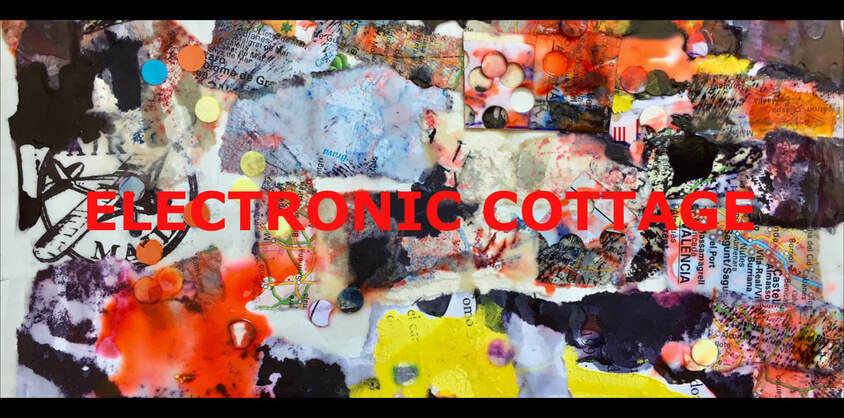
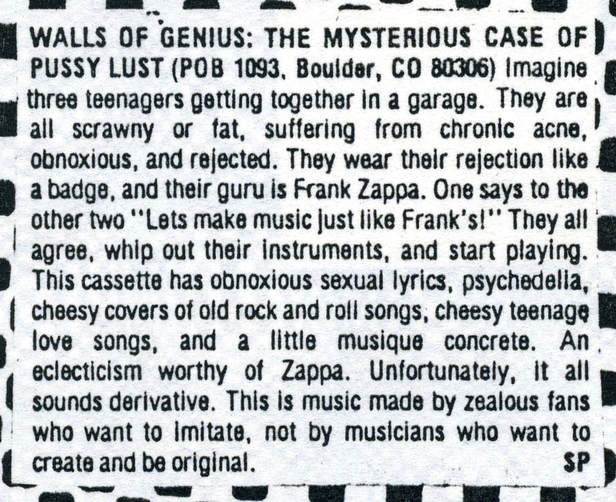
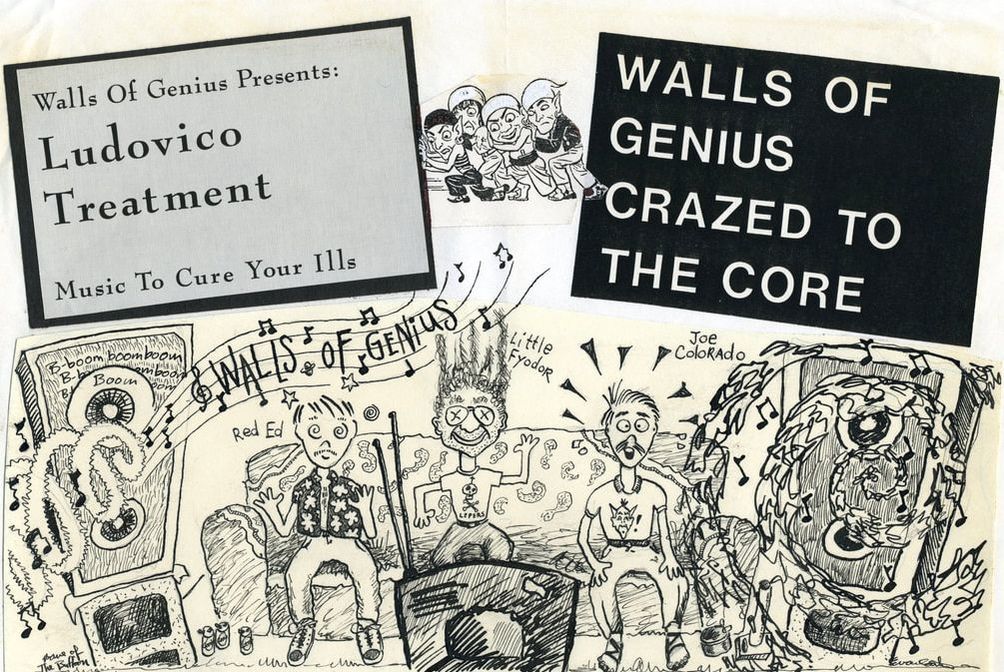
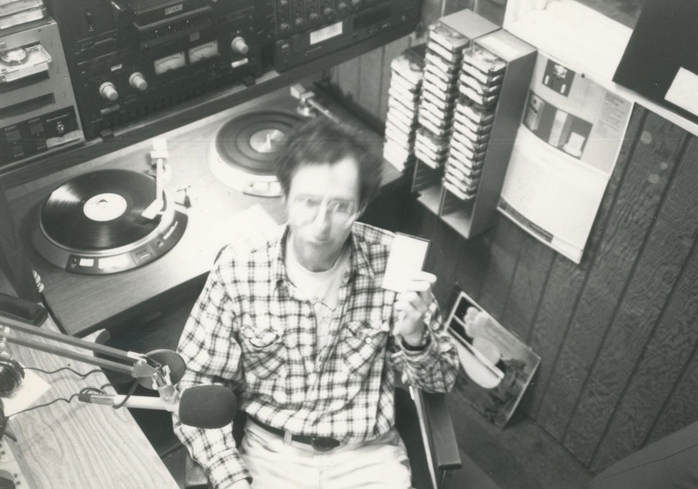

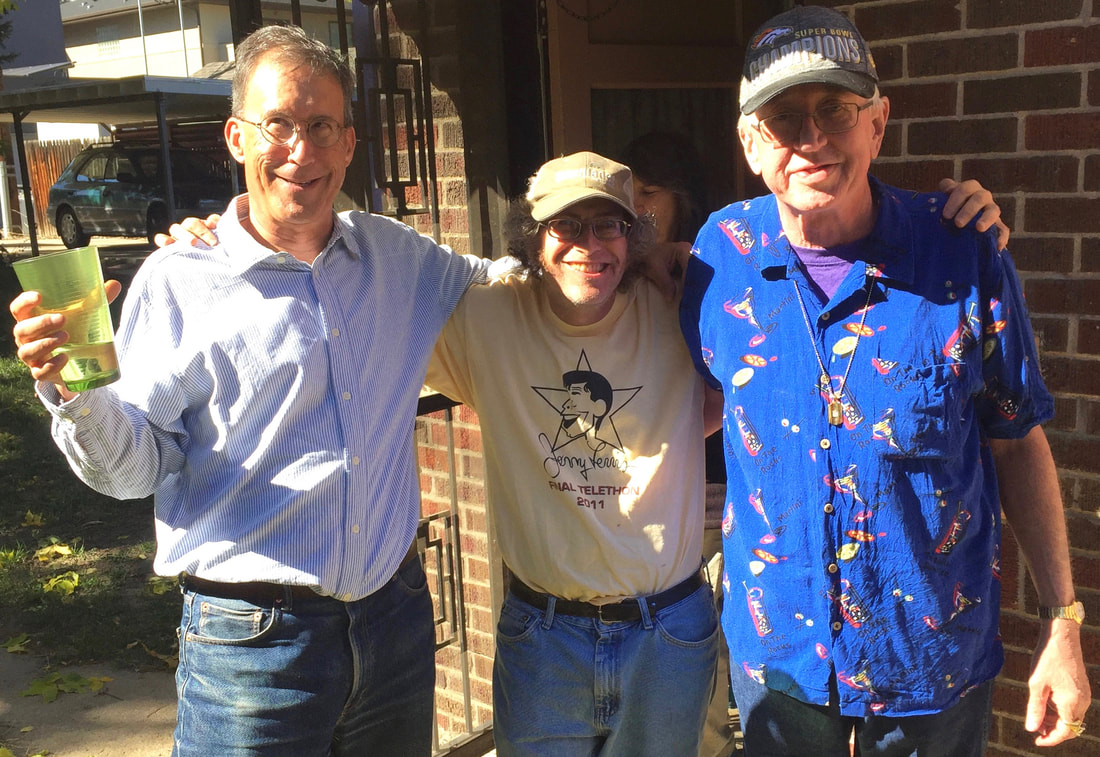
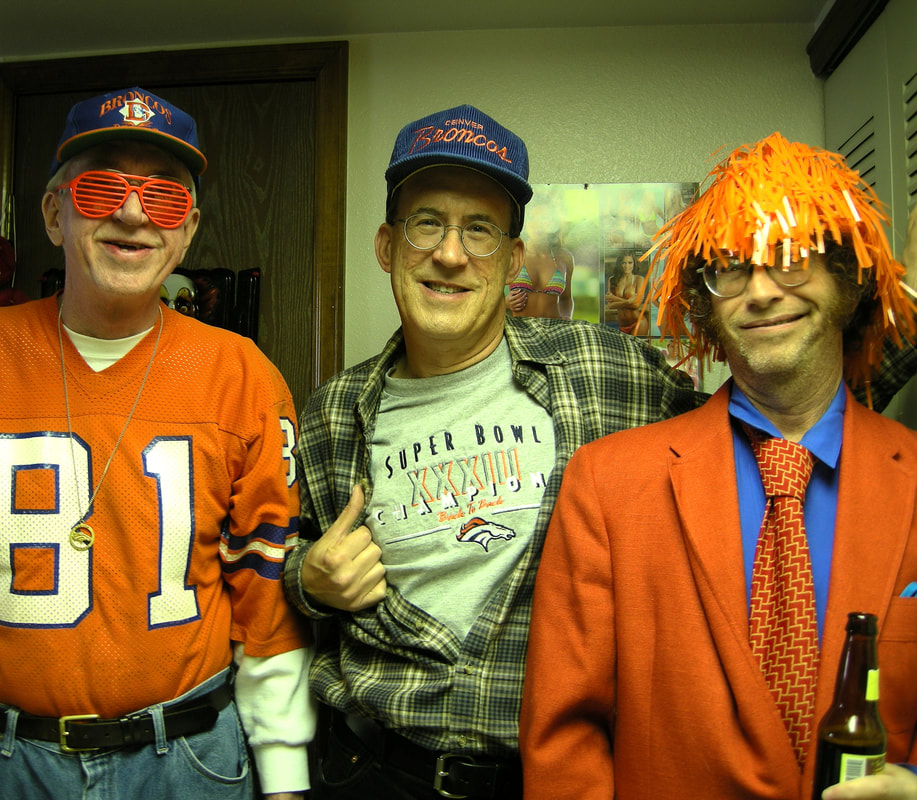
 RSS Feed
RSS Feed